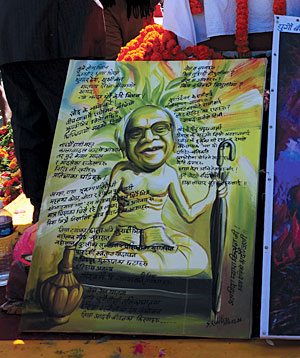 BIKRAM RAI |
The lives of widely admired statesmen often don't get much attention in their lifetimes. The media tends to focus on the more insalubrious characters in the political firmament. This is particularly the case in developing countries such as Nepal, where political corruption is taken for granted.
When politicians are praised, it is often only when they pass away, and flaws are graciously overlooked and virtues extolled to the heavens. Inevitably, assessments depend as much on the milieu in which said politician existed as in their inherent qualities.
When Girija Prasad Koirala died, his many critics stood back for the most part. Others scrambled to praise him, if only for his political longevity. With Krishna Prasad Bhattarai, the tipsy 'saint' of years gone by, the accolades would have flowed easier, not least because he had expired as a political force some time ago.
But of course Bhattarai, in his Gandhian guise, was an uncommon politician. He furnished a fairly unsullied link to the heady days of the first revolutions of Nepal. Whatever his shortcomings, he is remembered as the prime minister who brought together Nepal's interim constitution at a time when a quick transition to true democracy still seemed possible. In his spartan tastes (notwithstanding certain indulgences) he provided a stark counterpoint to every avaricious politician we have been forced to endure since.
So what have we learnt from the death of a statesman? Not, despite our struggles to complete the post-conflict transition, that Bhattarai's pronouncements on the necessity of a constitutional monarchy are valid in our present context. If they were once, they are not now; for this we should have been lucky enough to have a monarchy that was prepared to abide by the constitution, a decade back.
Rather, the public show of grief and the commentary surrounding Bhattarai's passing should serve to remind us what many in this nation still hold dear. The first is the attachment to revolutionary change, of which Bhattarai was a democratic embodiment. The second is the yearning for a statesman who will rise above party politics and self-enrichment for the good of the country. To what extent Krishna Prasad Bhattarai was a saint is open to debate. But Nepal's surviving politicians would do well to understand this: that it is in contrast to their shameful, unprincipled behaviour, and not some universal standard of corruption, that Bhattarai was held up as a saint.
READ ALSO:
Re-engagement, PRASHANT JHA
The Big Three's hostage, DAMAKANT JAYSHI


